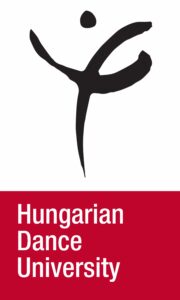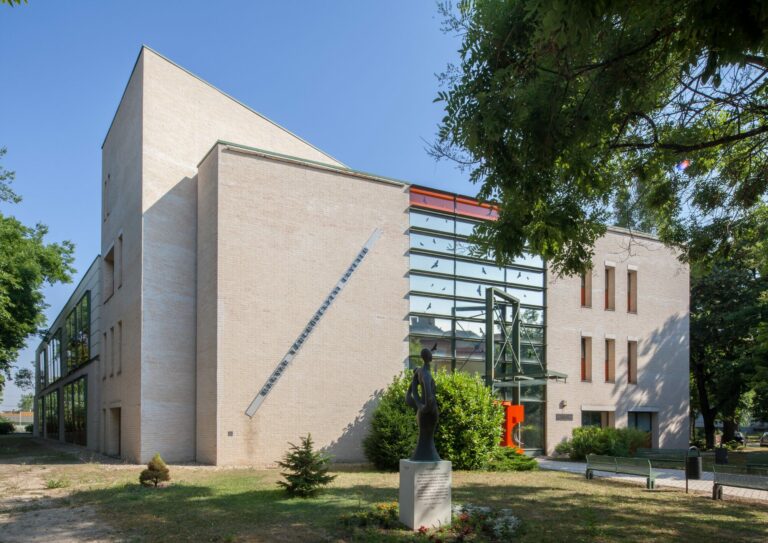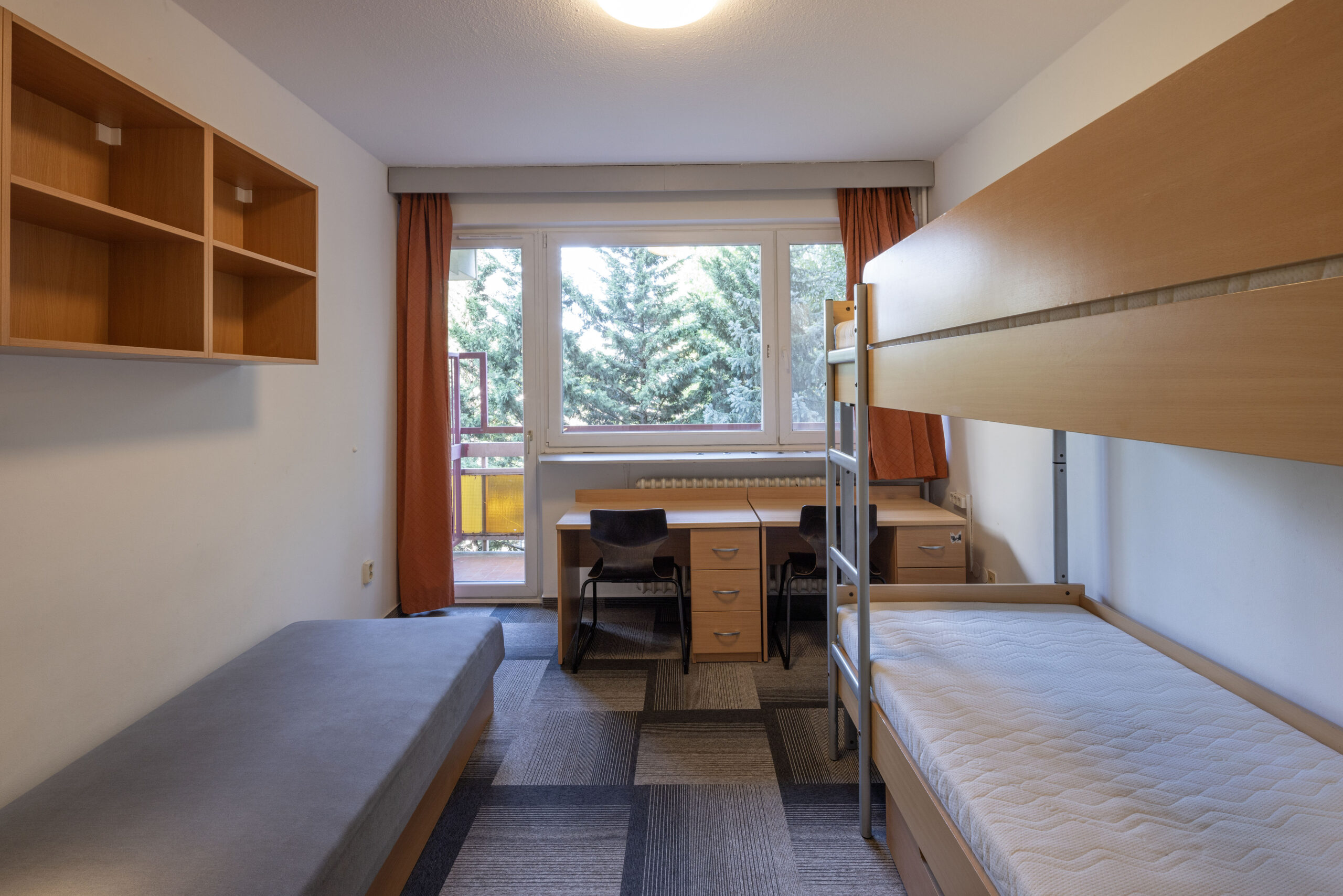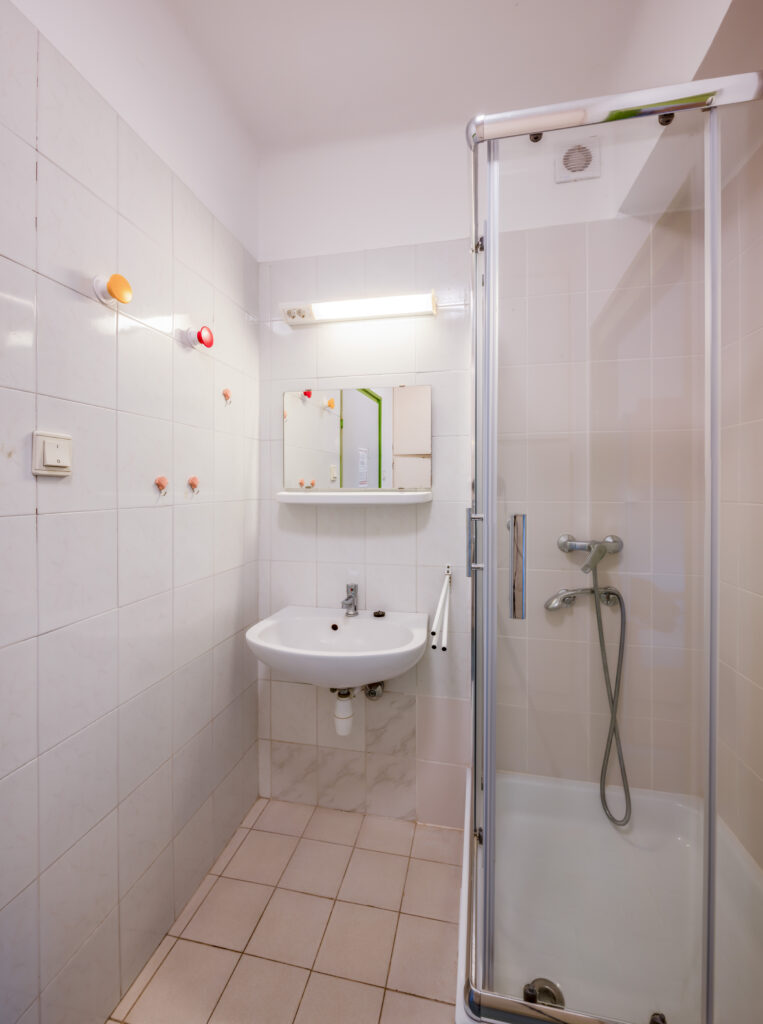The page is currently being uploaded.
Welcome to the Hungarian Dance University
Rector's welcome
Dear Newly Admitted Students,
Congratulations and a warm welcome to the Hungarian Dance University! It is with great joy and pride that we greet you as the newest members of our vibrant and diverse academic community.
You have embarked on an exciting journey that will not only refine your artistic talents but also shape you into the dance professionals of tomorrow. Our university is committed to providing an environment where you can thrive both artistically and academically. Here, you will find a blend of tradition and innovation, excellence and creativity, discipline and inspiration.
Our intitution, comprised of distinguished professionals and dedicated educators, is here to support you every step of the way. They will challenge you to push your limits, explore new possibilities, and reach your full potential.
We understand that starting a new chapter in a foreign country can be both exciting and challenging. Rest assured: our university community is here to support you.
Please take the time to explore this informational section, where you will find essential details regarding enrolment, campus life, and other important aspects of your transition to university life. We encourage you to read through the materials carefully and reach out to us with any questions or concerns you may have.
Once again, congratulations on your acceptance. We are thrilled to have you join us and look forward to witnessing your growth and success over the coming years. Welcome to the Hungarian Dance University where passion meets excellence!
Best regards,
Márta Fodor-Molnár
Rector of the Hungarian Dance University


General information
Hungarian Dance University
Address: H-1145 Budapest, Columbus utca 87-89,
E-mail: contact@mte.eu
Hungarian Dance University Dormitory
Address: H-1145, Budapest, Amerikai Street 100.
E-mail: petrak.bence@mte.eu

Practical matters
Enrolment Process
Step 1: Payment of Tuition and Registration Fees
Before anything else, you must pay the tuition and registration fees.
Personal enrolment will take place from August 21st to the 30th.
Payment Details:
– Tuition Fee: 2500 EUR/semester
– Registration Fee: 100 EUR
– Total: 2600 EUR
– Payment Deadline: August 21, 2024
– Bank Account Information:
Hungarian Dance University
IBAN: HU16 10300002-13267508-00034883
SWIFT (BIC): MKKB HU HB
Payment Reference: Please include the purpose of the payment (e.g., “John Doe tuition and registration fee”)
Step 2: Preparing the necessary documents
– Registration sheet: bring it with you signed and completed
– Proof of Payment: Receipt or bank statement showing the payment of tuition and registration fees.
– Identification: Valid passport or national ID.
– Health Insurance: Proof of valid health insurance coverage (for Hungary!).
– Passport photos: 4 pieces of paper-based passport photo.
– High school graduation certificate: If you already have it, we need it in English.
– Visa/Residence Permit: For non-EU students, a valid visa or residence permit is required, if you have already had it, please bring it with you.
– Learning Agreement: Please print out the learning agreement which will be sent shortly and bring it with you, signed (by your legal guardian if you are under 18).
– Consent form: completed and signed (by legal guardian in the case of minors) – soon will be sent
Step 3: Enrolment
– Location: Hungarian Dance University, ‘International office’ – Building A, office 13.
– Date: from August 21 to August 30, 2024 (If you arrive at the university later due to an urgent matter, you will be enrolled during your first week.)
– Time: After the foundation courses, at the time communicated in person on that week.
VISA AND RESIDENCE PERMIT
After passing the admission exam, you have received an official notification from HDU confirming your admission to the programme (a Letter of Acceptance document). For those who will be living on campus (dormitory or guest room), we also sent the accommodation certificate, which will also be needed to apply for a residence permit. Before starting your studies at the university, you must ensure your legal status in Hungary. The process varies depending on your country of origin. You will find the necessary documents and some useful information about residence permits on the second page of the registration sheet. It is important to note that minors are not allowed to apply, only an authorised adult representative.
If you are a citizen of an EU/EEA member state (including EU countries, Norway, Switzerland, Iceland, and Liechtenstein), you can travel to Hungary without a long-term study visa. However, you must obtain a registration card for the duration of your studies. For more details, visit: Registration certificate for EEA Nationals.
If you are a citizen of a non-EEA (European Economic Area) country, you are required to obtain a residence permit and register your accommodation upon arrival in Hungary. You may also need a visa.
It is crucial to thoroughly understand the process for obtaining a residence permit for study purposes (and a residence permit visa if necessary). Before submitting your application, carefully review the relevant sections on the official website of the National Directorate-General for Aliens Policing. For those who will be applying for their residence permit in Budapest, the University staff will be happy to help you. If you have any questions about the procedure, please contact one of the following:
-
- Hungarian Consulate in your home country
-
- National Directorate-General for Aliens Policing in Budapest
-
- International coordinator of HDU at sebok.csilla@mte.eu
Important information: Non-EEA citizens who need a visa must apply for a residence permit at a Hungarian embassy or consulate in their home country, along with the visa. Those who can travel to Hungary visa-free must apply for a residence permit online after arriving in Hungary.
Upon your arrival in Budapest, you can arrange your registration card (for EEA citizens) or residence permit (for non-EEA citizens) online via the Enter Hungary website of the National Directorate-General for Aliens Policing (formerly the Immigration and Asylum Office). This website allows you to manage registration cards, initial residence permit applications, residence permit extensions, and accommodation reports.
Please note that from January 1, 2023, all applications must be submitted online (or in the case of a D-visa, at a Hungarian embassy or consulate) and cannot be submitted in person at the office. Exceptions are made only in special cases or in situations of force majeure, supported by a request for equity.
HEALTH INSURANCE
The University will not be responsible for any injuries, accidents or material losses incurred to the students during his/her travel to and from Hungary or during his/her studies in Hungary.
When arriving in Hungary, ensure you have health insurance that covers healthcare services during your stay. Carefully review which type of health insurance (public or private) you can use for healthcare services in Hungary.
If you are a non-EEA student (from outside the European Economic Area), consider which option best suits your situation and what you are entitled to.
If you are an EEA student, it is advisable to apply for a European Health Insurance Card from your health insurance provider at home before you leave.
If you are a Stipendium Hungaricum scholarship holder, you are eligible for both a “TAJ card” (public health insurance) and supplementary (private) health insurance. After enrolment, please start arranging both!
Accomodation
Dormitory
Although the university does not have its own dormitory, we can accommodate our international students under 18 in the high school dormitory. The dormitory is located on campus and costs 180 euros per month.
Rooms are for 3 people, and the staff always take care to ensure that students of the same sex and age are in the same room.
There are small safes on the corridor (for money, and small things), but there are no places to lock the belongings in the room. There are three beds (one single, one bunk bed), two tabels and chairs in the rooms.
There is a shower and a sink inside the room. The toilets are on the corridors. There is one kitchen for the dormitory Students can cook there, but cooking raw meat and fish is not allowed due to health regulations. There’s a separate fridge compartment for everyone, where students can store what they’ve bought.
You can also order 3 meals a day from the university canteen. From this, lunch is a hot meal. You can read more about this in the ‘canteen’ section.
E-mail: petrak.bence@mte.eu


ARRIVAL, MOVE IN
As stated in the letter of acceptance, courses for international students will start on 21 August. This means that students will be able to move into their guest rooms on 19-20 August and to their dormitories on 20 August.
For more information on the details of moving into the dormitories, please contact the Director of the dormitory (petrak.bence@mte.eu).
Please also note that 20 August is a national holiday, so shops, pharmacies, etc. will be closed.
AIRPORT TRANSFERS
We would like to indicate that the university cannot arrange pick-ups!
-
- Airport Minibus: miniBUD is the official airport shuttle service provider for Budapest Airport. They offer comfortable, fast, and favorable transfer solutions for travelers heading from the airport to various districts in Budapest and vice versa. The service caters to individuals, families, and groups, ensuring reliable door-to-door transportation. Passengers can be transported from the airport to their hotel and back to the airport on time. Bookings can be made online in advance, where the cost of the service is also displayed. https://www.minibud.hu/en
-
- Taxis: The official taxi service operator from the airport is Főtaxi, please use only this service. You have to look for the Főtaxi desk outside the terminal (it is very easy to find). Bookings can be made online in advance, where the cost of the service is also displayed. https://fotaxi.hu/en/
-
- 100E Airport Express Bus: The 100E Airport Express bus provides a convenient, cost-effective, and fast connection between the airport and the city center. From Deák Ferenc tér, you can easily reach the university by taking Metro Line 1 (the yellow line) to Mexikói út station. The campus is a two-minute walk from that station.
Passengers can use their bank card as a ticket, purchasing and validating the special-price airport shuttle bus single ticket for 2,200 HUF directly on the 100E Airport Express. Details are available at: https://bkk.hu/en/travel-information/airport-express/
- 100E Airport Express Bus: The 100E Airport Express bus provides a convenient, cost-effective, and fast connection between the airport and the city center. From Deák Ferenc tér, you can easily reach the university by taking Metro Line 1 (the yellow line) to Mexikói út station. The campus is a two-minute walk from that station.
CHECK YOUR LUGGAGE
You are coming now for almost a whole year, so you have to pack for all seasons. Be prepared to pay some extra money if your baggage exceeds the weight limits of 20 kg on European flights and usually 30 kg on overseas flights. Please check the weight limit with your air company before travelling. Do not forget to pack the proper outfit for classical ballet (leotards, tights, practice and point shoes, warmers) and for modern dance. If you do not want to bring everything from home, but you intend to buy the necessary equipments in Budapest, please consult the international coordinator for shop contacts.
If you happen to forget anything, you may receive packages for the University’s address, but please indicate your name on it. Address for packages: Hungarian Dance University, Amerikai út 96, H-1145 Budapest, Hungary (It might go through customs, which takes time and money, so, if possible, avoid!)
Academic information
Foundation course + Orientation week
Foundation course information
Orientation week
In addition to the course, we have arranged some activities to help our new students to get familiar with the campus, the surrounding area, and fellow students. Below is the schedule for the orientation week activities:
August 21 – Campus Tour
Join us for a guided tour of the Hungarian Dance University campus. This is a great opportunity to explore the facilities, including classrooms, practice studios, and common areas. Get to know the layout of the campus and discover where you will be spending most of your time during your studies.
August 22 – Neighborhood Tour (Around 5:00 PM)
After your courses, we will take a walk around the neighborhood. Highlights include:
-
- Városliget (City Park)
- Local Shops and Pharmacies
- Public Transport Information
August 23 – Team Building (Around 5:00 PM)
Engage in fun and interactive team-building activities to get to know your peers.
Academic calendar
Autumn break 2024
Autumn break is usually issued between the public holidays of October 23rd and November 1st, in 2024 it is expected to be between October 23rd and November 3rd.
Winter break 2024
The winter break is issued in connection with Christmas and the New Year. It usually starts no later than December 23rd and lasts until January 2nd at the earliest. This break in 2024 is expected to start on December 21 and last approx. will last until January 6.
Spring break 2025
Spring break is timed to Easter, and is expected to be between April 17 and April 23, 2025.
Summer vacation 2025
The first day of the summer vacation is expected to be between June 21, 2025, and August 31.
Please note that these dates are preliminary and subject to change. The official academic calendar will be released by the university in September. The University’s school break schedule may differ slightly due to lectures, changes in the exam schedule, or unforeseen events.
Language requirements
Given that 100% of the theoretical classes and most of the practical classes are taught in English, it is important for the university to ensure that students have an adequate level of English language skills.
For all HDU programmes, the language requirements are a prerequisite for the award of the diploma. The content of this requirement is determined by the HDU Senate.
Criteria requirements can be fulfilled:
– by passing a criteria test organised by HDU, or
– by participating in an Erasmus programme for at least 1 semester, or
– by having a minimum level B1 in one of the EU languages
If someone does not want to get a diploma because his or her language level is below B1, he or she can choose to attend only the practical classes, in which case the university will issue a certificate of completion of the practical classes, not a diploma.
If someone’s language level is not up to the required level, they will have to attend English language development lessons, which will be integrated into the schedule.
—
Improving your English language skills is crucial, even if you do not intend to obtain a degree and are only participating in practical training. Here’s why:
1. Understanding Instructions: Many of our classes and training sessions are conducted in English. Being proficient in English ensures that you can fully comprehend the instructions given by your instructors.
2. Integration into the Community: English is the primary language of communication among students and faculty. Developing your English skills will help you integrate smoothly into our community and foster meaningful connections with your peers.
3. Asking for help: Being able to ask for help effectively is essential for your learning and development. Proficiency in English will enable you to clearly communicate your needs and concerns to instructors, peers, and support staff, ensuring that you receive the assistance you require.
4. Access to Resources: Many educational materials, resources, and opportunities are available in English. Enhancing your English skills will enable you to make the most of these resources.
5. Future Opportunities: Strong English skills can open up more opportunities for you in the future, whether in further education, international collaborations, or professional engagements.
Investing time in improving your English will significantly enhance your overall experience and success in our practical training programmes.
Head ballet masters
Although students work with several trainers during their programme, – because learning a range of dance languages is part of the training, – in the Dance Artist BA programme each year group has a lead ballet master with whom they work throughout their training.
Below is the list of the head ballet masters for each year group in association with Dance Artist programme.
| III. grade | Andrea Erdős |
| IV. grade – girls | Eszter Pataki-Tóth |
| IV-V. grade – boys | József Medvecz |
| V. grade – girls | Mónika Barna |
| VI. grade – girls | Márta Molnár |
| VI. grade – boys | Szilárd Macher |
| VII. grade – girls | Angéla Kövessy |
| VII-VIII. grade – boys | Zoltán Oláh |
| VIII. grade – girls | Eszter Kazinczy |
| IX. grade – girls | Katalin Volf |
| IX. grade – boys | Sándor Turi |
About Hungary
General information
Hungary is a landlocked country in Central Europe, known for its rich history and vibrant culture. The capital city, Budapest, is split by the Danube River and is famous for its stunning architecture and thermal baths. Hungarian is the official language, and the country has a population of approximately 10 million people. Hungary borders Austria, Slovakia, Ukraine, Romania, Serbia, Croatia and Slovenia. Hungary is a member of OECD, NATO, EU and the Schengen Zone, and its currency is the Hungarian Forint (HUF). The country has a diverse landscape, from the Great Plain in the east to the mountains in the north.
Hungary is one of the 15 most popular tourist destinations of the world. The country is also a home to numerous World Heritage Sites, UNESCO Biosphere Reserves, the largest water cave system and the second largest thermal lake in the world (Lake Hévíz), the largest lake in Central Europe (Lake Balaton) and the largest natural grasslands in Europe (Hortobágy).
Weather and climate
Hungary experiences four distinct seasons. Average annual temperature is 10.5 °C (50.9 °F). Summers (June to August) are warm to hot, with temperatures ranging from 20°C to 35°C. Winters (December to February) can be cold, with temperatures often falling below freezing. Spring (March to May) and autumn (September to November) are mild and pleasant. It’s advisable to bring clothing for a variety of weather conditions, including a warm coat for winter and lighter clothing for summer.
Currency
In Hungary, the official local currency has been the Forint (HUF) since 1946. The name derives from the city of Florence, where golden coins were historically minted.
You have numerous options for currency exchange in Hungary. Banks and ATMs provide convenient exchange services. Currency exchange services are available at banks and exchange offices. Always check the exchange rate and fees before exchanging money.
Credit cards are widely accepted in Budapest, though some smaller shops may only accept cash. If unsure, look for symbols and tags indicating accepted cards on the shop’s window. The most popular credit cards are VISA, MasterCard, and American Express. You can also pay by credit card at the university.
Please note that some shops accept Euros, but the exchange rate may be less favorable than the official rate.
You can find the official daily exchange rate at: https://www.mnb.hu/en/arfolyamok
Banking
You may want or need to open a bank account in another EU country. If you study at HDU with a Hungarian governmental scholarship (e.g., Stipendium Hungaricum), you are required to open a Hungarian bank account where your scholarship will be transferred.
How to open a bank account?
The bank is free to choose whether or not to accept your application. That is a private business decision for the bank. Before opening a bank account, the bank needs to get to know its potential clients. This may require more due diligence in assessing bank account requests from non-residents. Some banks may therefore have a policy not to accept non-resident customers. To open a bank account, you must present your passport and another identification document (such as a driver’s license, tax card, etc.). If you are a non-EEA student, it is usually necessary to have a valid residence permit and address card to open a bank account, although some banks allow foreigners to open an account with just the presentation of a passport.
In Hungary banks are typically open on weekdays from 8:00 a.m. until 4:00 p.m. Banks are not open on Saturdays except for some branches in shopping centres.
ATMS-s (Automatic teller machines)
ATMs can be found anywhere in Hungary and Budapest. Hungarian banks charge a commission for using ATMs. Note that higher service charges might apply for using an ATM that is not operated by the bank that issued your bank card. You don’t have to worry about exchanging Hungarian Forint before your arrival and carrying cash with you. ATMs are widely available in major cities, and they accept Visa and MasterCard.
Banks in Hungary
In the list below you can find several banks which offer bank services in Hungary.
- Budapest Bank: https://www.budapestbank.hu/
- CIB Bank: https://www.cib.hu/
- Citi Bank: https://www.citigroup.com/citi/contact.html
- Erste Bank: https://www.erstebank.hu/hu/ebh-nyito
- Gránit Bank: https://granitbank.hu/
- K&H Bank: https://www.kh.hu/
- KDB Bank: https://www.kdbbank.eu/
- MagNet Bank: https://www.magnetbank.hu/
- MKB Bank: https://www.mkb.hu/
- OTP Bank: https://www.otpbank.hu/
- Raiffeisen Bank: https://www.raiffeisen.hu/
- Takarék Kereskedelmi Bank: https://www.takarekbank.hu/
- UniCredit Bank: s://www.unicreditbank.hu
Transportation
Budapest has an extensive public transportation system, including buses, trams, and a metro system. Monthly passes and single tickets are available, with discounts for students. Long-distance travel is serviced by trains and buses, connecting Budapest with other major cities in Hungary and neighboring countries. Bicycles are also a popular mode of transport, with many bike rental services available. Taxis and ridesharing apps like Bolt are reliable options for getting around the city.
Public Transport in Budapest
Budapest boasts an efficient, diverse, and affordable public transport network, which includes buses, metro, trolleybuses, trams, suburban railway lines (HÉV), and boat services. These various modes of transport make it easy to reach any destination within the city quickly and conveniently.
The Centre for Budapest Transport (BKK) oversees the main public transport services in Budapest, ensuring an integrated system that includes buses, trams, metro, suburban trains, and trolleybuses.
Tickets Information
To use Budapest’s public transport, always carry a valid ticket or season pass. Tickets are widely available at metro and tram stations, street kiosks, and can be bought on buses for a slightly higher fee.
Ticket types and prices:
– Single ticket: HUF 450
– Single ticket bought on board: HUF 600
– Block of 10 tickets: HUF 4,000
– Airport shuttle bus single ticket (100E): HUF 2,200
– Monthly Budapest-pass for students: HUF 3,450
For regular use, consider buying a monthly or yearly pass. Students with a valid student card are eligible for reduced rates.
Note: Traveling without a valid ticket or pass can result in fines of HUF 12,000 on the spot or HUF 25,000 if paid later. At underground stations, you must present a valid ticket or pass to enter.
Buses
Budapest operates over 200 bus routes, covering most inner city and suburban areas. Some routes offer express services, indicated by an “E” following the bus number. Night bus services are also available on major routes.
Metro
Budapest’s metro system consists of four lines:
– M1 (Yellow Line): Vörösmarty tér to Mexikói út
– M2 (Red Line): Déli pályaudvar to Örs vezér tere
– M3 (Blue Line): Újpest Központ to Kőbánya-Kispest
– M4 (Green Line): Kelenföld to Keleti pályaudvar
The M1 line, opened in 1896, is the oldest metro line in mainland Europe. The newest line, M4, was opened in 2014. Metro services run from 4:30 AM to 11:30 PM.
Suburban Trains (HÉV)
The HÉV suburban train network connects Budapest with its suburban areas. A popular tourist route is from Batthyány tér to Szentendre. Remember, a special ticket is required if traveling outside the administrative borders of Budapest.
Ferry
Budapest operates three public boat lines:
– D-11: Müpa-Nemzeti Színház H – Újpest, Árpád út
– D-12: Müpa-Nemzeti Színház H – Rómaifürdő
– D-14: Soroksár, Molnár-sziget – Csepel-Királyerdő
A single boat ticket costs HUF 170, but travel is free with a monthly Budapest pass.
Taxi
Taxis can be hailed on the street, but booking by phone, online, or via apps is cheaper. Avoid unmarked taxis and only use those with company names on the outside. Since September 2013, all taxis in Budapest are uniformly yellow.
Night Buses
Budapest’s night buses operate from midnight until 4:00 AM, ensuring transport is available throughout the night. Night bus numbers start with 9, with some busy routes offering services every 10-15 minutes, while others to the suburbs may run once or twice an hour.
Cycling in Budapest – MOL Bubi
The MOL Bubi bike-sharing scheme offers apple-green bikes for rent at 98 docking stations across the city center. With 1,150 bikes available, it’s a convenient way to get around.
For more information, visit the official website of the MOL Bubi bike-sharing system.
Useful Tips
– Google Maps: Public transport data is integrated into Google Maps for easy route planning.
– Trip Planner: Use BudapestGO and download the app.
Electricity
Electricity in Hungary follows the European standard of 220-240 V. If you are coming from a country with a different electrical standard, you may need an adapter or a voltage converter for your electronic devices.
Electrical sockets in Hungary are of two European standard types: the “Type C” Europlug and the “Type E” and “Type F” Schuko. If your appliance’s plug does not fit these socket types, you will need a travel plug adapter to use your devices.
EMERGENCY NUMBERS
| Ambulance | 104 |
| Police | 107 |
| Fire Department | 105 |
| Central ER number | 112 |


